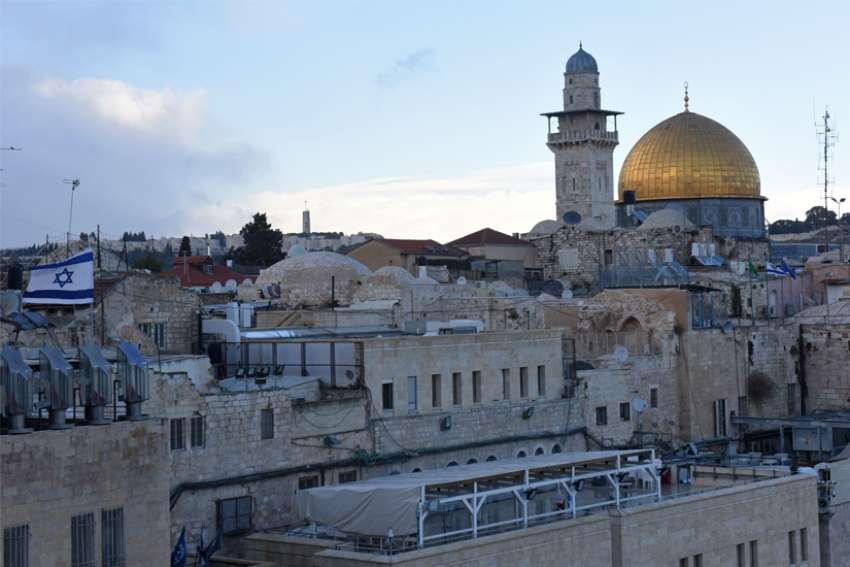Performed every 10 years since 1634 by the inhabitants of the village of Oberammergau in the state of Bavaria, the production, which involves the engagement of the local community, has been set back like other pilgrimage destinations, in this case until 2022. Maurais says she has left her deposit with International Heritage Tours, optimistic that she will be able to make the trip in a couple of years.
The senior has been largely relegated to her Ontario home while keeping safe from the virus. “I feel that I will need the vaccine before I travel again,” said Maurais, a regular pilgrim who visited the Holy Land with the tour group in November last year.
Gal Hana, the Israeli Director of Tourism for Canada, Ministry of Tourism, says Maurais’ optimism is reflective of the posture of the majority of Canadian pilgrims.
“I’m very close to my counterparts in the U.S. where they got a lot more cancellations, but Canadian people are resilient,” said Hana. “If they plan to go somewhere, they will go, they won’t cancel, they will postpone. I think it’s a very strong and positive sign of faith between the tourists, clientele and the industry.”
Israel has seen a 33-per-cent increase in Canadian tourists over the past three years and in 2019 welcomed 100,000 Canadians, 30 per cent of them pilgrims. Hana, who has been working for the Israeli Consul for Tourism in Canada for the past year, says the travel industry here has been client-focused and despite the revenue hit, agencies have been making the customer the number one concern. Given this, he is confident that once trips to the Holy Land and other destinations resume, Canada will recover quickly.
“I think the resiliency of Canadians will make the recovery much faster in Canada than in any other country,” said Hana. “This is why we invest so much more money in Canada than pretty much any other country in the world currently because we appreciate the ability of Canadians to recover.”
More than missing out on a vacation, the moral and spiritual significance of pilgrimages plays a key role in how tourists and agencies will come out of this, according to Halina Jablonski, Director of Catholic Tours at International Heritage Tours.
“When there is some kind of a calamity, whether there is a war or a recession or this coronavirus, after it passes people feel that they want to give thanks for the fact that they have gone through it,” said Jablonski, who has been with the agency for 10 years.
“They have somehow survived and have managed to go back to life and somehow they feel that God is part of this, and they should give thanks. Going on such a pilgrimage would be a thanksgiving trip.”
While International Heritage Tours continues to receive inquiries regarding upcoming trips, Jablonski says the decision was made to cancel all travel plans until spring of 2021 to avoid clients having any apprehension around travel. While many popular pilgrimage destinations such as the Basilica of the Holy Sepulchre in Jerusalem have re-opened, tour companies recognize the challenge around travel is not the border closures or business shutdowns but fears around the virus itself. Jablonski hopes that by next year, the situation will have improved in the form of a vaccine, effective treatment or the virus is efficiently suppressed.
“There is always a risk in everything when you are travelling but people will feel safe as long as the risks are minimal and there is some kind of treatment,” said Jablonski. “People want to go because they are tired of sitting at home.”
Given that Israel has a history of dealing with crisis, Hana says as a society it has been respectful of the measures that have been put in place to mitigate risks around COVID-19. Air Canada flights have resumed, and Hana hopes to see more travel by the fall as popular sites continue to announce re-opening after lockdown.
While not a replacement for in-person pilgrimages, some popular destinations are going the online virtual route for the 2020 season, allowing participants to perhaps experience the spiritual aspects of the visit despite not being physically present. Lac Ste. Anne in Alberta, whose five-day pilgrimage was scheduled for July 25-29, will hold a virtual event in its stead that will include live-streamed Masses and other programming.
The sanctuary of Lourdes in France, which attracts as many as five million visitors a year and has only partially re-opened, announced plans for a July 16 virtual international pilgrimage. The Fatima shrine in Portugal offers daily live-streams of praying the rosary and Masses. The Franciscan Custody of the Holy Land (custodia.org), which oversees 55 sanctuaries including the Church of the Nativity in Bethlehem, offers extensive histories and video of its pilgrimage sites.
While there is a hump to overcome as the virus is concerned, Hana implores that in-person pilgrimages to the Holy Land are an essential part of the journey of believers everywhere and can only be held back for so long.
“I think that Israel holds the ideal opportunity for any pilgrim to come and to practice their beliefs,” said Hana. “Not only are you going to see the places from the Scriptures, but people go to actually pray and grow in their faith.
“It’s the journey of a lifetime.”


